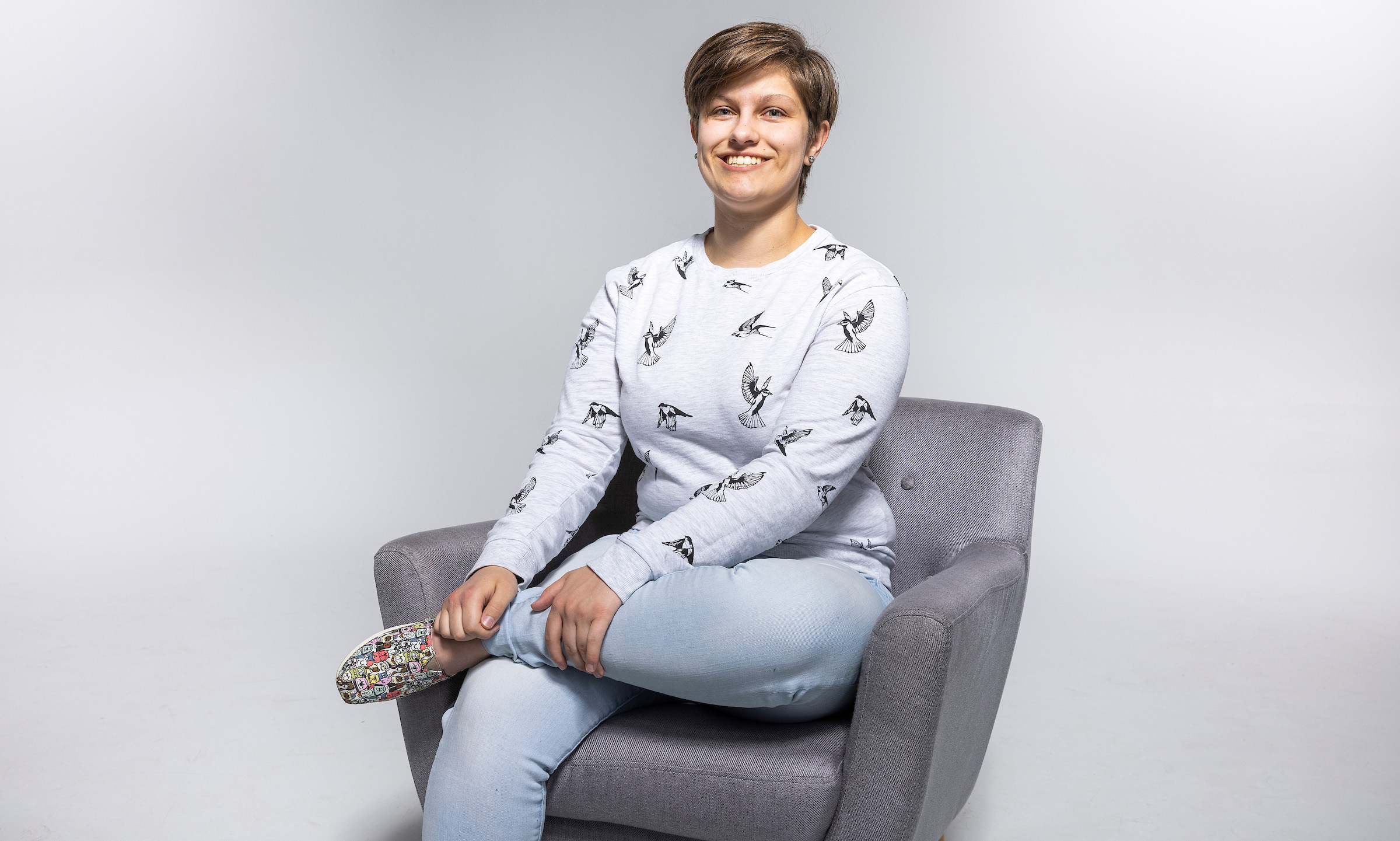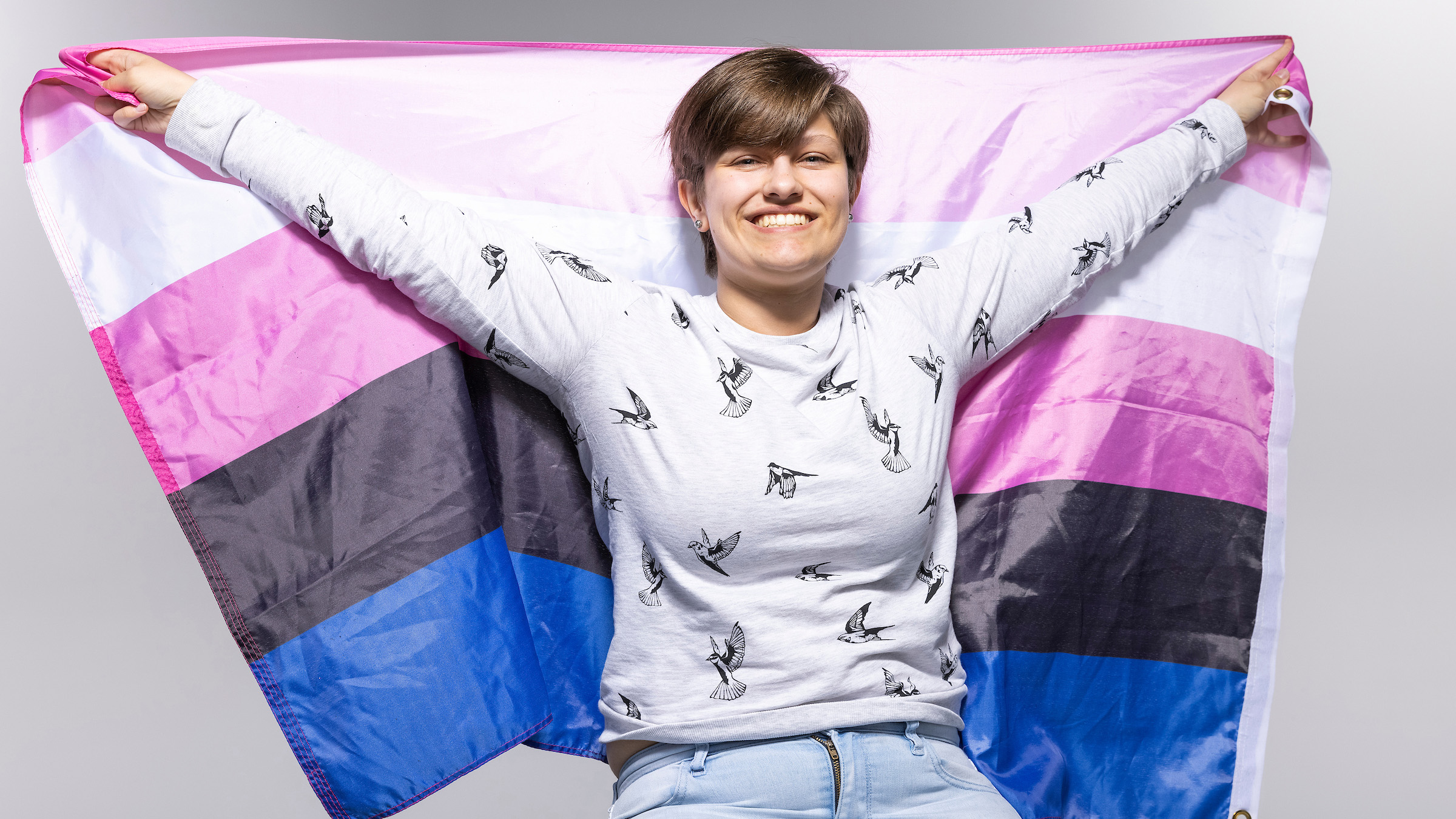As told by Taylor Johnson
UVU is a school where I feel safe being who I am. Everyone has a place here — and if you don’t have one, we will make one.

Photo by August Miller
My name is Chase Schetselaar. I am a family science major, and I currently serve as the president of Spectrum at UVU and as an inclusion ambassador on UVUSA. I was born here in Utah and have lived here all my life. My family spent the first year with my grandparents, and then my parents got a house in Provo, and I have been there ever since. I was a very creative child. I love to draw and write, and I began playing the violin when I was 5 years old.
I was born a Latter-day Saint, and I was also born with the letter "F" on my birth certificate. Even from a young age, I knew that the "F" was not entirely accurate. I always tried to mimic the boys in everything that I did. I remember getting yelled at for trying to take my shirt off like all the other boys because that was unacceptable.
The only time gender really came into my upbringing was regarding the LDS Church because the Church is stringent regarding gender — you are born with the gender you have, and it doesn’t change. When I was 8 or 9, gender started to “matter,” so I did my best to act like a girl. I had my “not like the other girls” phase where I turned my nose up at girly things and hung out with boys. I felt like I was a “better” girl for rejecting typical girly things and being more of a tomboy.
When I was in middle school, I was cast as Gavroche, a young boy, in Les Misérables at Provo High. I loved it. It felt so natural to me. I’m not sure if it came off that way, but it felt natural to me. I sometimes joked that I wished I was a boy so that I could play the part better. One of my favorite compliments I got was, "If you were a real boy, I'd have a crush on you." I wanted to be a real boy, but at the same time, I didn't. Things were confusing, and when I began puberty and my body started to change, that's when I felt so much disconnect between my body, what everyone told me I was, and what I felt like I was. I felt like I did not have a future. I felt aimless and that everything I did would not matter.
When I was 14 or 15, I started to learn about queer identities from social media. I learned about what it meant to be transgender, and I had never heard of it before because I was LDS and lived in Utah my entire life — and no one talked about those kinds of things. Over time, I felt this pull toward the label, "That's what I am! But there's an 'F' on my birth certificate, so I can't be that." On a Sunday in March, I was talking to my friend Nico, who is a trans man. I was trying to get ready for church, and every skirt or dress that I tried on did not seem right. I would look in the mirror, cry, and think, "This isn't the body I want. This doesn't feel right or comfortable." I told Nico this, and he asked me if I ever considered if I was trans. I told him I had thought about it, but that couldn’t be me — why would it? Then he asked, “Do you want to be?” After I said yes, he said, “Then you are. There are no boxes you need to check. If that's what you want to be, then you are." He asked me if there was a name I wanted to pick because even though I thought my birth name was beautiful, it never felt like it was mine. I chose 16 names and pitted them against each other March Madness-style. Chase ended up sweeping the competition, and I told Nico that was my new name. He started using it, and it felt like a light clicked on. That was the first moment where I felt like the future was attainable. I came out to my friends at school on March 31, 2015, my first Transgender Day of Visibility, and that day turned my entire life around for the better.
There was still tension between my religion and who I felt like I was. I pictured in my head that I was holding on to a cliff. Above the cliff were all the expectations of what people wanted for me — to be a full-time woman who fit such roles. Even though it was socially safe up there, I was miserable, like dangerous animals intended to hurt me. Letting go of the cliff was less secure and may have put me in social danger, but somehow, it felt safer. The waters below were acceptance of who I was, regardless of what society or a church expects. Letting go of all the expectations people held for me was difficult and terrifying because I had no idea what to expect, and I was afraid I would lose everyone I loved. But letting go allowed me to be a much more genuine and fulfilled person. (And it turns out, everyone who mattered didn’t mind and are just as supportive of me now as they were then.)

Everything has gotten better since. I experimented with labels, and I settled on the label gender-fluid. Once I did that, everything clicked. There are days where I feel like a woman, a man, or something nonbinary.
I always knew that I was going to attend UVU. I graduated from Provo High, so UVU was just down the street. Whenever I went to Provo Pride, I always saw UVU’s LGBTQ Student Services and Spectrum, and it made me see that they had a place for students like me. I originally was going to study aviation, but after running into one of the advisors for family science, I decided to switch my major to family science. Regarding my experience here, everything seems to have happened for a reason, and I cannot see it going any other way.
One of the best things about UVU is that I do not feel pressured to be anything except myself. In some queer spaces, there is pressure to conform to the cisgender binaries that you align more closely with, and on other campuses, there can be pressure to fit in with the rest of the university. I don’t feel any of that here at UVU. I found people that were like me, and it helped me realize that I don’t need to conform or change myself to fit in — I can just be Chase.
Next year, I will be serving as president of the UVU Inter-Club Council. I expect to graduate in fall 2022 or spring 2023. After I get my degree in family science, I want to attend graduate school and get my master’s degree in marriage and family therapy. I wanted to be a therapist at one point in my life, and I remember people telling me, “Don’t be a therapist! There are too many therapists in Utah.” But when I went to look for a therapist, I asked myself, “Where are they?” Especially when it comes to therapists who are understanding of queerness. I have seen families explode because a child came out as queer, and nobody knew how to handle it. While I want to help every family I can, I want to make sure that queer families understand that the spaces I create are a safe place to be.
If I could say anything to someone considering attending UVU, I would say that UVU is a school where I feel safe being who I am, and, to me, that is one of the most important things. I spent years fighting to figure out who I was and where I could be, and it's reassuring to know that I have a community here on campus that understands me. I have never felt alone on campus. Everyone has a place here — and if you don’t have one, we will make one.